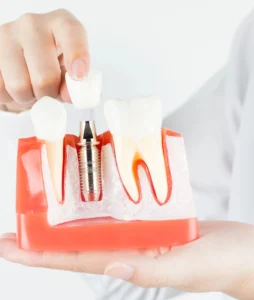Veneers and crowns help restore your smile. They can improve how your teeth look and function by adding an additional covering to your existing tooth (or teeth).
The main difference between both lies in how much of the original tooth is removed, the thickness of the material covering it, and how much of it will be covered.
Porcelain Veneers are made of thin porcelain color matched to your tooth and bonded to the front. Though they are strong, they can crack under repeated impact.
Crowns, on the other hand, cover the entire tooth. They can be made of porcelain, metal, or both. They’re also thicker than veneers which makes them more durable.
If you’re worried about the success rates of both procedures, rest assured. These are completely safe.
Here’s a detailed look at veneers and crowns to help you determine which one may be the right choice for you:
What Is a Veneer?
This method of teeth restoration covers only the front surface of the tooth. It’s a non-invasive technique that makes no surgical changes to the original tooth.
The procedure is simple. Approximately half an mm of a tooth’s enamel is ground before the veneer is bonded to the front. Newer types of veneers require even less grinding. Your dentist may give you a local anaesthetic because grinding can be slightly uncomfortable and painful.
For the porcelain veneer to bond correctly, your tooth needs enough enamel.
What to Expect
- Your dentist will begin by taking an impression of your tooth. This is usually done digitally or with a mold.
- You may wear a temporary veneer until the new one is ready to be fitted.
- Once the permanent veneer is ready, your dentist will bond it to your tooth using dental cement and a special UV light.
- Though there’s little to no movement of the tooth after your veneer is bonded, you may still need to wear a night guard, especially if you clench or grind your teeth at night.
What Is a Crown?
Unlike veneers, a crown covers your tooth entirely. The procedure is also more invasive as your tooth will need grinding or filing down.
In case of tooth decay, first, the decayed area of your tooth will need removal. After that, it will be built to support the newly fitted crown carefully.
Your tooth may also require building if there’s any damage. You’ll be given a local anaesthetic to ensure you have a painless procedure.
What to Expect
- Like veneers, your dentist will first take an impression of your tooth digitally or using a mold.
- You may get a temporary crown to continue using your tooth while a new one is made.
- Once the permanent crown is ready, it’ll be placed in the place of the temporary one. It’ll be adjusted to ensure it fits correctly. Then, the new crown is cemented in place.
- Sometimes, teeth with crowns may move. This can impact your bite. If this happens, you’ll need to get your crown readjusted.
Veneers or Crowns? Which One is Right for You?
Getting a crown will be the best option if you’ve had a root canal or a large filling or if you have a cracked, worn tooth.
On the other hand, if your tooth is almost perfect and you just need a few cosmetic tweaks and shape corrections, you should opt for Procelain Veneer West Hills.
Pros and Cons
Both veneer and crowns have their own pros and cons.
Veneer Pros
- They can be more aesthetic than crowns as they don’t show a gum margin even years later.
- They don’t require too much trimming, so most of your natural tooth remains.
- There’s minimal movement in teeth with veneers.
Veneer Cons
- Your tooth can be left exposed to decay.
- They may cost less but need to be replaced after a few years.
- They are irreversible.
Crown Pros:
- They cover the entire tooth, ensuring more protection
- They look just like natural teeth
- More permanent than dentures
Crown Cons
- A major chunk of your natural tooth is removed
- They may make your tooth more sensitive to cold and heat sensations
- They are fragile and may sustain damage over time
What to Ask Your Dentist
Before you decide on either, ask your dentist how much the crown and veneer will cost.
At West Hills Smiles, we offer our patients a variety of financing and insurance methods to fit dental care into your budget. We accept cash, debit, checks, MasterCard, Visa, and in-house financing and payment plans through CareCredit.
Some other significant questions to ask your dentist could be:
- Are there other options to choose from?
- How long will the crown or veneer last?
- Will you be required to wear a mouthguard?
- Will you need any special care for the crown or the veneer?
Conditions That Require Veneer and Crowns
Whether you should go with a veneer or a crown depends on what you’re trying to fix and the condition of your teeth.
Some of these include:
- Teeth discoloration
- Broken, cracked, or chipped teeth
- Crooked teeth
- Weakened or decayed teeth
- Aesthetic reasons
Conclusion
Both veneers and crowns can significantly improve your smile and teeth.
Porcelain Veneers are ideal for cosmetic changes like covering up chipped or crooked teeth, especially the front incisors.
Crowns are better when the tooth has sustained much decay or may need a root canal.
Get Quality Dental Care in West Hills, CA
Whether you need an emergency same-day dental appointment or need to get routine dental work done, you can count on West Hills Smiles.
Our Urgent Dental Care Near Me center provides you with top-notch dental services to restore and enhance the beauty of your smile.
We offer general dentistry, cosmetic dental services, dental implants, Invisalign, smile makeovers, and urgent emergency services.
So, visit us today and get affordable, high-quality dental treatment. While dental restoration procedures can be costly, West Hills Smiles offers patients a variety of cost-effective ways to pay for their treatment.






